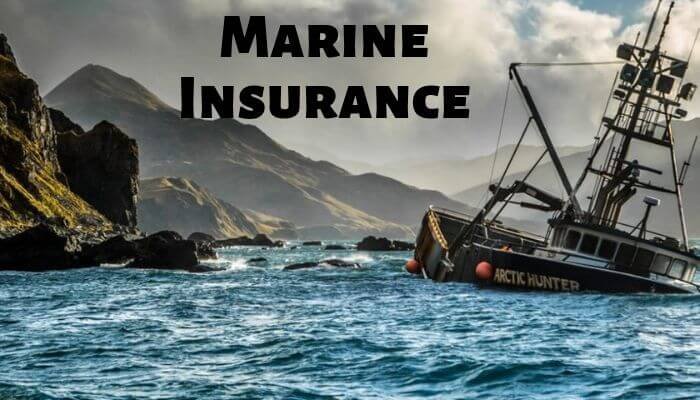Marine insurance plays a crucial role in protecting cargo, vessels, and other assets involved in maritime activities. Whether you’re a shipowner, cargo shipper, or importer/exporter, having the right marine insurance policy can safeguard against unforeseen losses due to accidents, piracy, or natural disasters. In this comprehensive guide, we’ll explore the various types of marine insurance policies, key features, and tips to choose the right coverage.
What is Marine Insurance?

Marine insurance provides financial protection against losses or damages to ships, cargo, terminals, and any transport or property used to transfer goods between points of origin and destination. It covers a wide range of risks such as sinking, collision, piracy, theft, and natural calamities. Marine insurance policies ensure that businesses involved in global trade can mitigate financial losses due to these unforeseen events.
Importance of Marine Insurance
- Risk Mitigation: Protects against financial losses from unexpected accidents or damages.
- Global Trade Security: Ensures the safety of goods transported across international borders.
- Compliance with Regulations: Many countries mandate marine insurance for commercial shipping operations.
- Protection Against Natural Disasters: Covers damages caused by storms, hurricanes, and other natural calamities.
Types of Marine Insurance Policies
1. Hull Insurance
Hull insurance covers physical damages to the vessel or ship. It protects the shipowner from losses due to accidents, collisions, or natural disasters. This policy also covers machinery and equipment essential for vessel operation.
- Who Needs It?
Shipowners, vessel operators, and shipping companies. - Coverage Includes:
- Damage to the hull and machinery.
- Collisions with other vessels.
- Sinking or capsizing.
2. Cargo Insurance
Cargo insurance protects goods or merchandise transported via sea, air, or land. It compensates for losses or damages to the cargo during transit. This type of insurance is critical for exporters, importers, and freight forwarders.
- Who Needs It?
Shippers, exporters, and importers. - Coverage Includes:
- Theft, loss, or damage of goods.
- Fire or explosion during transit.
- Risks associated with piracy.
3. Freight Insurance
Freight insurance covers the loss of freight revenue if cargo is damaged or lost during shipment. It protects shipping companies from financial losses due to non-payment of freight charges.
- Who Needs It?
Freight operators and shipping companies. - Coverage Includes:
- Loss of freight revenue.
- Compensation for damaged goods.
- Protection against delays caused by unforeseen circumstances.
4. Liability Insurance
Liability insurance provides coverage against third-party liabilities arising from damage to cargo, vessels, or other maritime assets. It also covers legal expenses and compensation in the event of injury or loss of life.
- Who Needs It?
Shipowners, freight operators, and cargo handlers. - Coverage Includes:
- Liability arising from collisions.
- Legal expenses for claims and lawsuits.
- Environmental damage caused by the vessel.
5. Marine Hull and Machinery (H&M) Insurance
H&M insurance offers extensive coverage for damages to a vessel’s hull and its machinery. It protects against both partial and total loss.
- Who Needs It?
Vessel owners, shipping companies, and operators. - Coverage Includes:
- Accidental damage to the ship’s structure.
- Loss or damage to machinery.
- Salvage and repair costs.
Key Components of Marine Insurance Policies

1. Perils Covered
Marine insurance policies typically cover a wide range of perils, including:
- Fire and explosion
- Stranding, sinking, and grounding
- Collision with other vessels
- Piracy and theft
- Natural disasters like storms and earthquakes
2. Exclusions and Limitations
It’s essential to understand the exclusions and limitations of marine insurance policies. Common exclusions include:
- War and nuclear risks
- Willful misconduct by the insured
- Delay in delivery or shipment
- Wear and tear of machinery
3. Policy Duration and Validity
Marine insurance policies may vary in duration depending on the type of coverage:
- Voyage Policy: Valid for a specific voyage or shipment.
- Time Policy: Covers a specific period, typically one year.
- Mixed Policy: Combines features of both voyage and time policies.
How to Choose the Right Marine Insurance Policy
1. Evaluate Your Risk Profile
Identify the specific risks associated with your shipping or cargo operations. Different policies provide varying levels of protection depending on the nature of your business.
2. Assess the Value of Your Assets
Determine the value of your cargo, vessel, or freight services to ensure adequate coverage. Underestimating asset value may lead to insufficient compensation in the event of a claim.
3. Compare Policy Options
Compare different marine insurance policies offered by various providers. Look for comprehensive coverage that addresses your specific needs and offers reasonable premiums.
4. Understand Policy Terms and Conditions

Read and understand the fine print, including exclusions, deductibles, and claims procedures. Clarify any doubts with your insurance provider before finalizing the policy.
5. Work with a Reputable Insurer
Choose an insurance provider with a strong track record in the marine insurance sector. A reliable insurer ensures prompt claim settlements and provides expert guidance.
Filing a Marine Insurance Claim
To file a successful marine insurance claim, follow these steps:
- Notify the Insurer: Inform the insurance company about the incident as soon as possible.
- Provide Documentation: Submit relevant documents such as the bill of lading, shipping invoices, and survey reports.
- Cooperate with Investigation: Cooperate with the insurer’s investigation to assess the extent of damage or loss.
- Claim Settlement: Upon verification, the insurer will process and settle the claim according to the policy terms.
Also Read : The Benefits Of Whole Life Insurance: A Lifetime Of Coverage
Conclusion
Marine insurance is essential for protecting ships, cargo, and freight against unforeseen risks during transit. By understanding the different types of marine insurance policies and their coverage, businesses can ensure the safety of their assets and mitigate potential financial losses. Whether you are a shipowner or a cargo shipper, choosing the right marine insurance policy ensures smooth operations and long-term stability.
FAQs
1. What is the purpose of marine insurance?
Marine insurance protects against financial losses due to damage or loss of ships, cargo, and freight during transit.
2. What types of perils are covered by marine insurance?
Perils such as fire, explosion, collision, piracy, and natural disasters are typically covered under marine insurance policies.
3. How is cargo insurance different from hull insurance?
Cargo insurance covers goods transported by sea, air, or land, while hull insurance covers physical damage to the vessel or ship.
4. What factors determine marine insurance premiums?
Factors such as the value of the cargo, route, type of vessel, and potential risks determine marine insurance premiums.
5. How can I file a marine insurance claim?
To file a marine insurance claim, notify your insurer immediately, provide relevant documentation, and cooperate with the investigation process.





